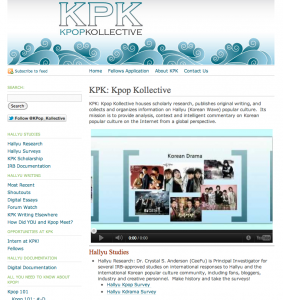 Dr. Crystal Anderson, Associate Professor of English, publishes her research in a medium that many scholars avoid: A blog.
Dr. Crystal Anderson, Associate Professor of English, publishes her research in a medium that many scholars avoid: A blog.
Anderson, who teaches classes in Asian film and literature, stumbled upon “Kpop,” or Korean popular music that is part of culture (“Hallyu,” a cultural movement) that strives to spread Korean culture throughout the globe through music, film and television. As she continued to explore Kpop, she found that there was no centralized place to get information. She launched her blog, Kpop Kollective, as both a vehicle for her research and as an online Kpop information hub that fosters collaboration.
So although Anderson’s blog is an untraditional way to publish her research, she has found many benefits to it, including:
A hybrid nature
What differentiates Anderson’s blog from other Kpop websites, she says, is its ability to combine both fun information and theoretical research, which has been approved by Elon’s Institutional Review Board.
“There’s nothing like it on the Internet,” Anderson says. “It’s not a fan club or a super academic, scholarly, theoretical approach that isn’t approachable for those consuming Korean popular culture. That’s why we want to emphasize the hybrid nature – it’s fun and serious.”
Anderson follows her “hybrid” approach by combining fan news with more complex discussion about Kpop’s impact on society. For example, a recent blog post by a KPK member focused on blonde Kpop stars. Since blonde hair does not naturally occur in Asian cultures, it is exotic, unusual and can represent rebellion, Anderson said. Blog posts like these generate intelligent discussion about Kpop trends.
A broad reach
Since people around the world are interested in Korean pop culture, Anderson feels that a blog is the perfect place to publish her research. She also knows that having an accessible blog will contribute to the reliable information about Kpop on the Internet.
“If the purpose of scholarship is to contribute to the body of knowledge so people can learn, this is the new way to do it,” Anderson says. “It makes academics approach what they do in a different way.”
Blog feedback is also instantaneous and public. Anderson and the other Kpop Kollective bloggers end up communicating with people all over the world.
“You find a larger community,” Anderson says. “I talk to people in Singapore and Australia.”
Allows collaboration
Though Anderson describes herself as something like a managing editor of Kpop Kollective, she stresses that she relies on others to create the final product.
“We have a lot of people with a lot of different skill sets,” Anderson says. “We take anyone who is passionate and committed.”
Kpop Kollective writers include Elon students, an academic librarian at the University of South Carolina and even a 15-year-old in California. The diversity of writers adds to the hybrid, dynamic nature of the blog.
For more information about Kpop research, contact Dr. Anderson at canderson14@elon.edu. For information about incorporating blogs into your classroom or research, contact Teaching and Learning Technologies at 336-278-5006 or tlt@elon.edu.








 Follow
Follow






